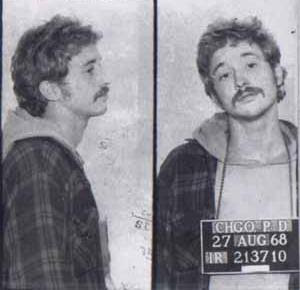 I was surprised to be listening to the news and hear mention of the Weather Underground.
I was surprised to be listening to the news and hear mention of the Weather Underground.The Weatherman, a radical liberal American terrorist organization in the late 1960s and 70s that was based out of Chicago. This group did terrorist acts against the United States, often bombing police stations, court buildings, and prisons as well as major US targets like the Pentagon and the US Capital. Violence and bombs by the weather underground occurred across the US in Detroit, New York, Chicago, and San Fransisco.
There purposes often were vague, but were related to fighting US Imperialism and Capitalism, and was lead typically by college students and college educated white Americans, and often paralleled the black liberation movement. Some protests had more direct purposes, while others seemed to be more destruction oriented than message oriented. The Weatherman's group largely disintegrated after the Vietnam War
 The story of the Weathermen was told exquisitely in the Academy Award documentary, The Weather Underground (best documentary nod in 2004). The documentary largely focuses on one of the principal leaders, Billy Ayers. This documentary is particularly interesting, simply because it's interesting to watch in our current age where discussions on terrorism are very politically, socially, and culturally prevalent following the September, 11th attacks in 2001.
The story of the Weathermen was told exquisitely in the Academy Award documentary, The Weather Underground (best documentary nod in 2004). The documentary largely focuses on one of the principal leaders, Billy Ayers. This documentary is particularly interesting, simply because it's interesting to watch in our current age where discussions on terrorism are very politically, socially, and culturally prevalent following the September, 11th attacks in 2001.There has been a recent discussion of the Weather Underground, and particularly the unapologetic leader William Ayers (pictured left) in relation to Barack Obama. Obama is apparently associates to some degree with the adult William Ayers who is now professor of education at the University of Illinois-Chicago. Although Ayers never was convicted of any crime, he also is completely honest and unashamed of his involvement in the Weather Underground, often making comments to the effect of people not setting off enough bombs today.
Obama and Ayers were both members of an anti-poverty organization called the Woods Fund of Chicago. Ayers and Obama also both live a few blocks from each other in Hyde Park Chicago, and Ayers has given money to Obama's campaign.
This connection has led some people to suggest that Obama is more left-leaning than he would like most people to believe.
Texas billionaire Harold Simmons, who has created a controversial non-profit American Issues Project that funded heavy ad campaigns in 13 markets connecting Obama to Ayers has created a stir, including a response by the Obama campaign directed at McCain.
This campaign is certainly grizzly and aggressive and we're nowhere close to November yet. While, I'd love to know you're thoughts on this connection, the commercials, and Bill Ayers connection...
But beyond that, the point of this post is really to encourage you to rent or netflix or find somehow a copy of Sam Green & Bill Siegel's documentary The Weather Underground. It's a great film, and really something that will entertain and stir a unique discussion.

 Less than two weeks ago, StrangeCulture readers entered into an
Less than two weeks ago, StrangeCulture readers entered into an 



 I recently watched the acclaimed film by Sydney Pollack, They Shoot Horses, Don't They?
I recently watched the acclaimed film by Sydney Pollack, They Shoot Horses, Don't They?
 So...it wouldn't be a good year of film without some controversy.
So...it wouldn't be a good year of film without some controversy.




 Remember Media Play? I thought it was the coolest store in the mid-90s when they were popping up all over the place.
Remember Media Play? I thought it was the coolest store in the mid-90s when they were popping up all over the place.


 Over the past couple weeks I have had the chance to watch the 13 Episode first season of Mad Men.
Over the past couple weeks I have had the chance to watch the 13 Episode first season of Mad Men.